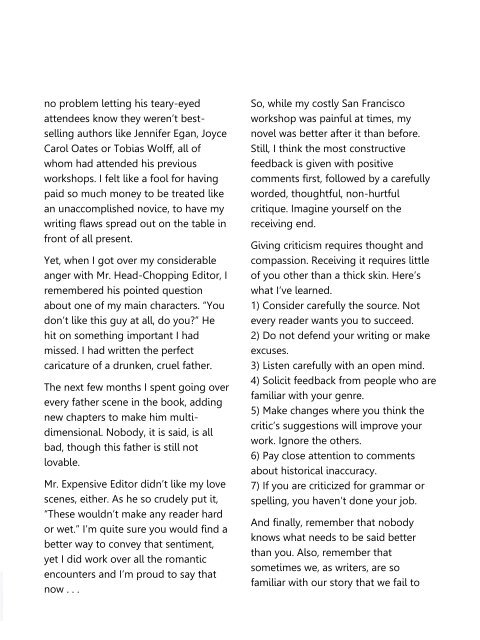Enthralled Magazine Vol 1 Issue 2 - Reflect
You also want an ePaper? Increase the reach of your titles
YUMPU automatically turns print PDFs into web optimized ePapers that Google loves.
no problem letting his teary-eyed<br />
attendees know they weren’t bestselling<br />
authors like Jennifer Egan, Joyce<br />
Carol Oates or Tobias Wolff, all of<br />
whom had attended his previous<br />
workshops. I felt like a fool for having<br />
paid so much money to be treated like<br />
an unaccomplished novice, to have my<br />
writing flaws spread out on the table in<br />
front of all present.<br />
Yet, when I got over my considerable<br />
anger with Mr. Head-Chopping Editor, I<br />
remembered his pointed question<br />
about one of my main characters. “You<br />
don’t like this guy at all, do you?” He<br />
hit on something important I had<br />
missed. I had written the perfect<br />
caricature of a drunken, cruel father.<br />
The next few months I spent going over<br />
every father scene in the book, adding<br />
new chapters to make him multidimensional.<br />
Nobody, it is said, is all<br />
bad, though this father is still not<br />
lovable.<br />
Mr. Expensive Editor didn’t like my love<br />
scenes, either. As he so crudely put it,<br />
“These wouldn’t make any reader hard<br />
or wet.” I’m quite sure you would find a<br />
better way to convey that sentiment,<br />
yet I did work over all the romantic<br />
encounters and I’m proud to say that<br />
now . . .<br />
So, while my costly San Francisco<br />
workshop was painful at times, my<br />
novel was better after it than before.<br />
Still, I think the most constructive<br />
feedback is given with positive<br />
comments first, followed by a carefully<br />
worded, thoughtful, non-hurtful<br />
critique. Imagine yourself on the<br />
receiving end.<br />
Giving criticism requires thought and<br />
compassion. Receiving it requires little<br />
of you other than a thick skin. Here’s<br />
what I’ve learned.<br />
1) Consider carefully the source. Not<br />
every reader wants you to succeed.<br />
2) Do not defend your writing or make<br />
excuses.<br />
3) Listen carefully with an open mind.<br />
4) Solicit feedback from people who are<br />
familiar with your genre.<br />
5) Make changes where you think the<br />
critic’s suggestions will improve your<br />
work. Ignore the others.<br />
6) Pay close attention to comments<br />
about historical inaccuracy.<br />
7) If you are criticized for grammar or<br />
spelling, you haven’t done your job.<br />
And finally, remember that nobody<br />
knows what needs to be said better<br />
than you. Also, remember that<br />
sometimes we, as writers, are so<br />
familiar with our story that we fail to


















